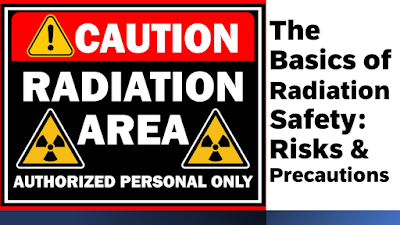The Basics of Radiation Safety:
Risks and Precautions
Exposure to high
levels of radiation energy can be dangerous to human beings and can lead to
serious health problems. Radiation is a type of energy that is present
everywhere in our environment. It's a natural occurrence. This is why radiation
safety is so important. In this article, we'll discuss the basics of radiation
safety, including the risks associated with radiation exposure and the
precautions you can take to protect yourself.
The Risks of Radiation Exposure
The radiation energy is dangerous to human being if the exposure is above the specified level as per the standards. The severity of exposure defends on various factors. The severity of the effects of radiation exposure depends on the type of radiation, the duration of exposure, and the distance from the source of radiation. Exposure to high levels of radiation can have serious health consequences, including an increased risk of cancer, genetic mutations, and other health problems. The types of radiation also is very important to know about the impacts.
There are two types
of radiation: ionizing radiation and non-ionizing radiation. Ionizing radiation
is more harmful than non-ionizing radiation because it has enough energy to
ionize atoms and molecules in the body, which can damage DNA and other cellular
structures. Ionizing radiation source is most used in industry environments for
various proposes like measuring & reactivity actions. Ionizing radiation
also plays a vital role in health management. Examples of sources of ionizing
radiation include x-rays, gamma rays, and radioactive materials. Non-ionizing
radiation, on the other hand, is less harmful and includes sources such as
radio waves and microwaves.
Precautions You Can Take
To protect yourself from radiation exposure, there are several precautions you can take:
Avoid unnecessary exposure to sources of radiation: Avoiding or Limiting your exposure to sources of radiation is the best way to reduce your risk. This includes avoiding unnecessary medical procedures that use radiation, such as x-rays and CT scans. Without the doctor consultation should not go for x-rays and CT scans.
Wear protective clothing and personal protective equipment: If you work with sources of radiation, wearing protective clothing and personal protective equipment can help to reduce your exposure. Examples of protective clothing and personal protective equipment include lead aprons, gloves, and goggles.
Follow safety
guidelines and procedures: The industries and health management handling or
working with radiation should have the written safety guideline and procedures
for the same and the respective employees should be trained on these guidelines.
If you work with sources of radiation, it's important to follow safety
guidelines and procedures to minimize your exposure. This may include
monitoring your exposure to radiation, following proper decontamination
procedures, and properly storing and disposing of radioactive materials.
Test your home for radon gas: Radon gas is a naturally occurring radioactive gas that can accumulate in buildings, especially in basements and other low-lying areas. Testing your home for radon gas with radiation safety expert and taking steps to reduce exposure if necessary, can help to reduce your risk.
Conclusion
Radiation safety is
an important topic that affects all of us. While we can't completely avoid
radiation exposure, we can take steps to reduce our risk. By limiting
unnecessary exposure to sources of radiation, wearing protective clothing and
equipment, following safety guidelines and procedures, and testing our homes
for radon gas, we can help to protect ourselves and our families from the
harmful effects of radiation.

No comments:
Post a Comment